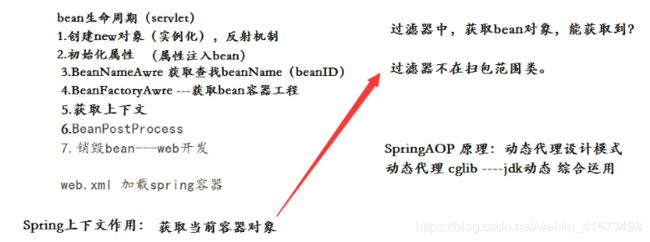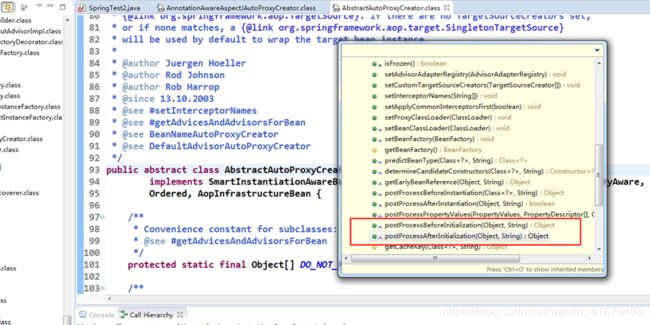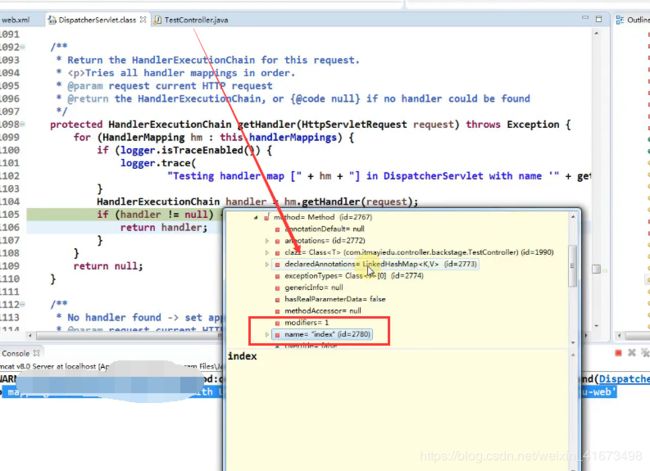源码分析
目录
分析源码
Spring源码分析
IOC体系
BeanFactory (1)
BeanDefinition(2) -做xml解析,封装了spirngbean文件
Bean的解析方式
Bean生命周期分析
SpringAop源码分析 -解决重复代码
AbstractAutoProxyCreator类(3)
SpringMVC执行流程
分析源码
Spring源码分析
BeanFactory
Spring Bean的创建是典型的工厂模式,这一系列的Bean工厂,也即IOC容器为开发者管理对象间的依赖关系提供了很多便利和基础服务,在Spring中有许多的IOC容器的实现供用户选择和使用,其相互关系如下:
IOC体系
BeanFactory (1)
BeanFactory定义了 IOC 容器的最基本形式,并提供了 IOC 容器应遵守的的最基本的接口,也就是Spring IOC 所遵守的最底层和最基本的编程规范。在 Spring 代码中, BeanFactory 只是个接口,并不是 IOC容器的具体实现,但是 Spring 容器给出了很多种实现,如 DefaultListableBeanFactory 、 XmlBeanFactory 、ApplicationContext 等,都是附加了某种功能的实现。
public interface BeanFactory {
//这里是对FactoryBean的转义定义,因为如果使用bean的名字检索FactoryBean得到的对象是工厂生成的对象,
//如果需要得到工厂本身,需要转义
//转义符“&”用来获取FactoryBean本身
String FACTORY_BEAN_PREFIX = "&";
//根据bean的名字进行获取bean的实例,这是IOC最大的抽象方法
Object getBean(String name) throws BeansException;
//根据bean的名字和Class类型进行获取Bean的实例,和上面方法不同的是,bean名字和Bean 的class类型不同时候会爆出异常
T getBean(String name, Class requiredType) throws BeansException;
T getBean(Class requiredType) throws BeansException;
Object getBean(String name, Object... args) throws BeansException;
//检测这个IOC容器中是否含有这个Bean
boolean containsBean(String name);
//判断这个Bean是不是单利
boolean isSingleton(String name) throws NoSuchBeanDefinitionException;
//判断这个Bean是不是原型
boolean isPrototype(String name) throws NoSuchBeanDefinitionException;
//查询指定的bean的名字和Class类型是不是指定的Class类型
boolean isTypeMatch(String name, Class targetType) throws NoSuchBeanDefinitionException;
//这里对得到bean实例的Class类型
Class getType(String name) throws NoSuchBeanDefinitionException;
//这里得到bean的别名,如果根据别名检索,那么其原名也会被检索出来
String[] getAliases(String name);
}
BeanDefinition(2) -做xml解析,封装了spirngbean文件
这个接口,可以理解为xml bean元素的数据载体。通过对比xml bean标签的属性列表和BeanDefinition的属性列表一看便知。
我的理解,是解析XML的过程,就是 xml
有一个类BeanDefinitionHolder,BeanDefinitionHolder,根据名称或者别名持有beanDefinition,它承载了name和BeanDefinition的映射信息。
BeanWarpper:
提供对标准javabean的分析和操作方法:单个或者批量获取和设置属性值,获取属性描述符,查询属性的可读性和可写性等。支持属性的嵌套设置,深度没有限制。
AbstractRefreshableApplicationContext的refreshBeanFactory()这个方法
@Override
protected final void refreshBeanFactory() throws BeansException {
if (hasBeanFactory()) {
destroyBeans();
closeBeanFactory();
}
try {
//创建IOC容器工程
DefaultListableBeanFactory beanFactory = createBeanFactory();
beanFactory.setSerializationId(getId());
customizeBeanFactory(beanFactory);
//加载配置文件
loadBeanDefinitions(beanFactory);
synchronized (this.beanFactoryMonitor) {
this.beanFactory = beanFactory;
}
}
catch (IOException ex) {
throw new ApplicationContextException("I/O error parsing bean definition source for " + getDisplayName(), ex);
}
}
//加载配置文件
protected void loadBeanDefinitions(XmlBeanDefinitionReader reader) throws BeansException, IOException {
Resource[] configResources = getConfigResources();
if (configResources != null) {
reader.loadBeanDefinitions(configResources);
}
String[] configLocations = getConfigLocations();
if (configLocations != null) {
reader.loadBeanDefinitions(configLocations);
}
}
protected final void refreshBeanFactory() throws BeansException {
if (hasBeanFactory()) {
destroyBeans();
closeBeanFactory();
}
try {
DefaultListableBeanFactory beanFactory = createBeanFactory();//创建IOC容器
beanFactory.setSerializationId(getId());
customizeBeanFactory(beanFactory);
loadBeanDefinitions(beanFactory);//载入loadBeanDefinitions
synchronized (this.beanFactoryMonitor) {
this.beanFactory = beanFactory;
}
}
catch (IOException ex) {
throw new ApplicationContextException("I/O error parsing bean definition source for " + getDisplayName(), ex);
}
}
public abstract class AbstractXmlApplicationContext extends AbstractRefreshableConfigApplicationContext { 实现
/**
* Loads the bean definitions via an XmlBeanDefinitionReader.
* @see org.springframework.beans.factory.xml.XmlBeanDefinitionReader
* @see #initBeanDefinitionReader
* @see #loadBeanDefinitions
*/
@Override
protected void loadBeanDefinitions(DefaultListableBeanFactory beanFactory) throws BeansException, IOException {
// Create a new XmlBeanDefinitionReader for the given BeanFactory.
XmlBeanDefinitionReader beanDefinitionReader = new XmlBeanDefinitionReader(beanFactory);
// Configure the bean definition reader with this context's
// resource loading environment.
beanDefinitionReader.setResourceLoader(this);
beanDefinitionReader.setEntityResolver(new ResourceEntityResolver(this));
// Allow a subclass to provide custom initialization of the reader,
// then proceed with actually loading the bean definitions.
initBeanDefinitionReader(beanDefinitionReader);
loadBeanDefinitions(beanDefinitionReader);
}
先调用本类里面的loadBeanDefinitions
protected void loadBeanDefinitions(XmlBeanDefinitionReader reader) throws BeansException, IOException {
Resource[] configResources = getConfigResources();
if (configResources != null) {
reader.loadBeanDefinitions(configResources);
}
String[] configLocations = getConfigLocations();
if (configLocations != null) {
reader.loadBeanDefinitions(configLocations);
}
}
委托给reader.loadBeanDefinitions(configLocation); XmlBeanDefinitionReader
通过XmlBeanDefinitionReader来读取。下面看一下XmlBeanDefinitionReader这个方法,但其实并不在这个类实现这个方法,而是在它的基类里面AbstractBeanDefinitionReader
public int loadBeanDefinitions(String... locations) throws BeanDefinitionStoreException {
Assert.notNull(locations, "Location array must not be null");
int counter = 0;
for (String location : locations) {
counter += loadBeanDefinitions(location);
}
return counter;
}
进入到loadBeanDefinitions
public int loadBeanDefinitions(EncodedResource encodedResource) throws BeanDefinitionStoreException {
Assert.notNull(encodedResource, "EncodedResource must not be null");
if (logger.isInfoEnabled()) {
logger.info("Loading XML bean definitions from " + encodedResource.getResource());
}
Set currentResources = this.resourcesCurrentlyBeingLoaded.get();
if (currentResources == null) {
currentResources = new HashSet(4);
this.resourcesCurrentlyBeingLoaded.set(currentResources);
}
if (!currentResources.add(encodedResource)) {
throw new BeanDefinitionStoreException(
"Detected cyclic loading of " + encodedResource + " - check your import definitions!");
}
try {
InputStream inputStream = encodedResource.getResource().getInputStream();//获取IO
try {
InputSource inputSource = new InputSource(inputStream);
if (encodedResource.getEncoding() != null) {
inputSource.setEncoding(encodedResource.getEncoding());
}
return doLoadBeanDefinitions(inputSource, encodedResource.getResource());//这个方法从流中读取
}
finally {
inputStream.close();
}
}
catch (IOException ex) {
throw new BeanDefinitionStoreException(
"IOException parsing XML document from " + encodedResource.getResource(), ex);
}
finally {
currentResources.remove(encodedResource);
if (currentResources.isEmpty()) {
this.resourcesCurrentlyBeingLoaded.remove();
}
}
}
进入到doLoadBeanDefinitions Resource IO封装
protected int doLoadBeanDefinitions(InputSource inputSource, Resource resource)
throws BeanDefinitionStoreException {
try {
int validationMode = getValidationModeForResource(resource);
Document doc = this.documentLoader.loadDocument(
inputSource, getEntityResolver(), this.errorHandler, validationMode, isNamespaceAware());
return registerBeanDefinitions(doc, resource); //解析XML
}
catch (BeanDefinitionStoreException ex) {
throw ex;
}
catch (SAXParseException ex) {
throw new XmlBeanDefinitionStoreException(resource.getDescription(),
"Line " + ex.getLineNumber() + " in XML document from " + resource + " is invalid", ex);
}
catch (SAXException ex) {
throw new XmlBeanDefinitionStoreException(resource.getDescription(),
"XML document from " + resource + " is invalid", ex);
}
catch (ParserConfigurationException ex) {
throw new BeanDefinitionStoreException(resource.getDescription(),
"Parser configuration exception parsing XML from " + resource, ex);
}
catch (IOException ex) {
throw new BeanDefinitionStoreException(resource.getDescription(),
"IOException parsing XML document from " + resource, ex);
}
catch (Throwable ex) {
throw new BeanDefinitionStoreException(resource.getDescription(),
"Unexpected exception parsing XML document from " + resource, ex);
}
}
进入到registerBeanDefinitions
/**
* Register the bean definitions contained in the given DOM document.
* Called by loadBeanDefinitions.
* Creates a new instance of the parser class and invokes
* registerBeanDefinitions on it.
* @param doc the DOM document
* @param resource the resource descriptor (for context information)
* @return the number of bean definitions found
* @throws BeanDefinitionStoreException in case of parsing errors
* @see #loadBeanDefinitions
* @see #setDocumentReaderClass
* @see BeanDefinitionDocumentReader#registerBeanDefinitions
*/
public int registerBeanDefinitions(Document doc, Resource resource) throws BeanDefinitionStoreException {
// Read document based on new BeanDefinitionDocumentReader SPI.
BeanDefinitionDocumentReader documentReader = createBeanDefinitionDocumentReader();
int countBefore = getRegistry().getBeanDefinitionCount();
documentReader.registerBeanDefinitions(doc, createReaderContext(resource));
return getRegistry().getBeanDefinitionCount() - countBefore;
}
documentReader.registerBeanDefinitionsXML解析
/**
* Parses bean definitions according to the "spring-beans" DTD.
*
Opens a DOM Document; then initializes the default settings
* specified at <beans> level; then parses
* the contained bean definitions.
*/
public void registerBeanDefinitions(Document doc, XmlReaderContext readerContext) {
this.readerContext = readerContext;
logger.debug("Loading bean definitions");
Element root = doc.getDocumentElement();
BeanDefinitionParserDelegate delegate = createHelper(readerContext, root);
preProcessXml(root);
parseBeanDefinitions(root, delegate);
postProcessXml(root);
}
-----遍历节点
protected void parseBeanDefinitions(Element root, BeanDefinitionParserDelegate delegate) {
if (delegate.isDefaultNamespace(root)) {
NodeList nl = root.getChildNodes();
for (int i = 0; i < nl.getLength(); i++) {
Node node = nl.item(i);
if (node instanceof Element) {
Element ele = (Element) node;
if (delegate.isDefaultNamespace(ele)) {
parseDefaultElement(ele, delegate); //默认解析
}
else {
delegate.parseCustomElement(ele);
}
}
}
}
else {
delegate.parseCustomElement(root);
}
}
---判断解析类
private void parseDefaultElement(Element ele, BeanDefinitionParserDelegate delegate) {
if (delegate.nodeNameEquals(ele, IMPORT_ELEMENT)) {
importBeanDefinitionResource(ele);//import类型
}
else if (delegate.nodeNameEquals(ele, ALIAS_ELEMENT)) {
processAliasRegistration(ele);//别名方式
}
else if (delegate.nodeNameEquals(ele, BEAN_ELEMENT)) {
processBeanDefinition(ele, delegate);//bean解析方式
}
}
Bean的解析方式
进入到 AbstractBeanDefinition beanDefinition = parseBeanDefinitionElement(ele, beanName, containingBean); 使用反射初始化类
public AbstractBeanDefinition parseBeanDefinitionElement(
Element ele, String beanName, BeanDefinition containingBean) {
this.parseState.push(new BeanEntry(beanName));
String className = null;
if (ele.hasAttribute(CLASS_ATTRIBUTE)) {
className = ele.getAttribute(CLASS_ATTRIBUTE).trim();
}
try {
String parent = null;
if (ele.hasAttribute(PARENT_ATTRIBUTE)) {
parent = ele.getAttribute(PARENT_ATTRIBUTE);
}
AbstractBeanDefinition bd = createBeanDefinition(className, parent);
parseBeanDefinitionAttributes(ele, beanName, containingBean, bd);
bd.setDescription(DomUtils.getChildElementValueByTagName(ele, DESCRIPTION_ELEMENT));
parseMetaElements(ele, bd);
parseLookupOverrideSubElements(ele, bd.getMethodOverrides());
parseReplacedMethodSubElements(ele, bd.getMethodOverrides());
parseConstructorArgElements(ele, bd);
parsePropertyElements(ele, bd);
parseQualifierElements(ele, bd);
bd.setResource(this.readerContext.getResource());
bd.setSource(extractSource(ele));
return bd;
}
catch (ClassNotFoundException ex) {
error("Bean class [" + className + "] not found", ele, ex);
}
catch (NoClassDefFoundError err) {
error("Class that bean class [" + className + "] depends on not found", ele, err);
}
catch (Throwable ex) {
error("Unexpected failure during bean definition parsing", ele, ex);
}
finally {
this.parseState.pop();
}
return null;
}
进入到AbstractBeanDefinition bd = createBeanDefinition(className, parent);
protected AbstractBeanDefinition createBeanDefinition(String className, String parentName)
throws ClassNotFoundException {
return BeanDefinitionReaderUtils.createBeanDefinition(
parentName, className, this.readerContext.getBeanClassLoader());
}
进入到BeanDefinitionReaderUtils.createBeanDefinition
public static AbstractBeanDefinition createBeanDefinition(
String parentName, String className, ClassLoader classLoader) throws ClassNotFoundException {
GenericBeanDefinition bd = new GenericBeanDefinition();
bd.setParentName(parentName);
if (className != null) {
if (classLoader != null) {
bd.setBeanClass(ClassUtils.forName(className, classLoader));//使用java反射机制初始化
}
else {
bd.setBeanClassName(className);
}
}
return bd;
}
Bean生命周期分析
- spring对bean进行实例化,默认bean是单例
2)spring对bean进行依赖注入
3)如果bean实现了BeanNameAware接口,spring将bean的id传给setBeanName()方法
4)如果bean实现了BeanFactoryAware接口,spring将调用setBeanFactory方法,将BeanFactory实例传进来
5)如果bean实现了ApplicationContextAware()接口,spring将调用setApplicationContext()方法将应用上下文的引用传入
6) 如果bean实现了BeanPostProcessor接口,spring将调用它们的postProcessBeforeInitialization接口方法
7) 如果bean实现了InitializingBean接口,spring将调用它们的afterPropertiesSet接口方法,类似的如果bean使用了init-method属性声明了初始化方法,改方法也会被调用
8)如果bean实现了BeanPostProcessor接口,spring将调用它们的postProcessAfterInitialization接口方法
9)此时bean已经准备就绪,可以被应用程序使用了,他们将一直驻留在应用上下文中,直到该应用上下文被销毁
10)若bean实现了DisposableBean接口,spring将调用它的distroy()接口方法。同样的,如果bean使用了destroy-method属性声明了销毁方法,则该方法被调用
2) public class UserEntity
3) implements BeanFactoryAware, BeanNameAware, InitializingBean, DisposableBean, ApplicationContextAware {
4)
5) private String userName;
6) private Integer age = null;
7)
8) public UserEntity() {
9) System.out.println("无惨构造函数.....");
10) }
11)
12) public UserEntity(String userName, Integer age) {
13) System.out.println("我是有参构造函数 userName:" + userName + ",age:" + age);
14) this.userName = userName;
15) this.age = age;
16) }
17)
18) public String getUserName() {
19)
20) return userName;
21) }
22)
23) public void setUserName(String userName) {
24)
25) this.userName = userName;
26) }
27)
28) public Integer getAge() {
29)
30) return age;
31) }
32)
33) public void setAge(Integer age) {
34)
35) this.age = age;
36) }
37)
38) @Override
39) public String toString() {
40) return "UserEntity [userName=" + userName + ", age=" + age + "]";
41) }
42)
43) // bean容器销毁
44) public void destroy() throws Exception {
45) System.out.println("destroy() 销毁bean");
46)
47) }
48)
49) // afterPropertiesSet方法,初始化bean的时候执行,可以针对某个具体的bean进行配置
50) public void afterPropertiesSet() throws Exception {
51) System.out.println("afterPropertiesSet");
52) }
53)
54) // 如果bean实现了BeanNameAware接口,spring将bean的id传给setBeanName()方法
55) public void setBeanName(String name) {
56) System.out.println("setBeanName() set name:" + name);
57) }
58)
59) // 如果bean实现了BeanNameAware接口,spring将bean的id传给setBeanName()方法
60) public void setBeanFactory(BeanFactory beanFactory) throws BeansException {
61) System.out.println("setBeanFactory()");
62) }
63)
64) // 获取Spring容器上下文
65) public void setApplicationContext(ApplicationContext applicationContext) throws BeansException {
66) System.out.println("获取上下文....");
67)
68) }
69)
70) }
71) ---------------72)
System.out.println("开始初始化容器....");
ClassPathXmlApplicationContext app = new ClassPathXmlApplicationContext("spring.xml");
System.out.println("容器初始化成功....");
UserEntity userEntity = (UserEntity) app.getBean("userEntity01");
System.out.println("关闭容器...");
app.registerShutdownHook();
SpringAop源码分析 -解决重复代码
AbstractAutoProxyCreator类(3)
spring 容器启动,每个bean的实例化之前都会先经过AbstractAutoProxyCreator类的postProcessAfterInitialization()这个方法,然后接下来是调用wrapIfNecessary方法。
SpringMVC执行流程
Spring工作流程描述
1. 用户向服务器发送请求,请求被Spring 前端控制Servelt DispatcherServlet捕获;
2. DispatcherServlet对请求URL进行解析,得到请求资源标识符(URI)。然后根据该URI,调用HandlerMapping获得该Handler配置的所有相关的对象(包括Handler对象以及Handler对象对应的拦截器),最后以HandlerExecutionChain对象的形式返回;
3. DispatcherServlet 根据获得的Handler,选择一个合适的HandlerAdapter。(附注:如果成功获得HandlerAdapter后,此时将开始执行拦截器的preHandler(...)方法)
4. 提取Request中的模型数据,填充Handler入参,开始执行Handler(Controller)。 在填充Handler的入参过程中,根据你的配置,Spring将帮你做一些额外的工作:
HttpMessageConveter: 将请求消息(如Json、xml等数据)转换成一个对象,将对象转换为指定的响应信息
数据转换:对请求消息进行数据转换。如String转换成Integer、Double等
数据根式化:对请求消息进行数据格式化。 如将字符串转换成格式化数字或格式化日期等
数据验证: 验证数据的有效性(长度、格式等),验证结果存储到BindingResult或Error中
5. Handler执行完成后,向DispatcherServlet 返回一个ModelAndView对象;
6. 根据返回的ModelAndView,选择一个适合的ViewResolver(必须是已经注册到Spring容器中的ViewResolver)返回给DispatcherServlet ;
7. ViewResolver 结合Model和View,来渲染视图
8. 将渲染结果返回给客户端。
Spring工作流程描述
为什么Spring只使用一个Servlet(DispatcherServlet)来处理所有请求?
详细见J2EE设计模式-前端控制模式
Spring为什么要结合使用HandlerMapping以及HandlerAdapter来处理Handler?
符合面向对象中的单一职责原则,代码架构清晰,便于维护,最重要的是代码可复用性高。如HandlerAdapter可能会被用于处理多种Handler。
每个hander代表路径
















